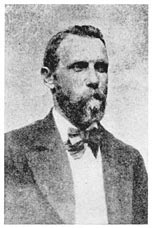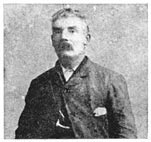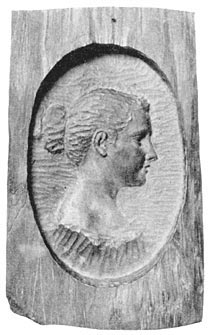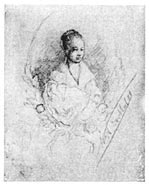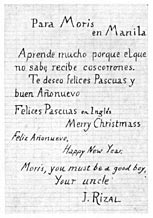A butterfly seeking the flowers and the light,
Of other lands dreaming, of vaster extent;
Scarce a youth, from home and love I took flight,
To wander unheeding, free from doubt or affright—
So in foreign lands were my brightest days spent.
And when like a languishing bird I was fain
To the home of my fathers and my love to return,
Of a sudden the fierce tempest roar’d amain;
So I saw my wings shatter’d and no home remain,
My trust sold to others and wrecks round me burn.
Hurl’d out into exile from the land I adore,
My future all dark and no refuge to seek;
My roseate dreams hover round me once more,
Sole treasures of all that life to me bore;
The faiths of youth that with sincerity speak.
But not as of old, full of life and of grace,
Do you hold out hopes of undying reward;
Sadder I find you; on your lov’d face,
Though still sincere, the pale lines trace
The marks of the faith it is yours to guard.
You offer now, dreams, my gloom to appease,
And the years of my youth again to disclose;
So I thank you, O storm, and heaven-born breeze,
That you knew of the hour my wild flight to ease,
To cast me back down to the soil whence I rose.
By the spreading beach where the sands are soft and fine,
At the foot of the mount in its mantle of green;
I have found a home in the pleasant grove’s confine,
In the shady woods, that peace and calmness divine,
Rest for the weary brain and silence to my sorrow keen.
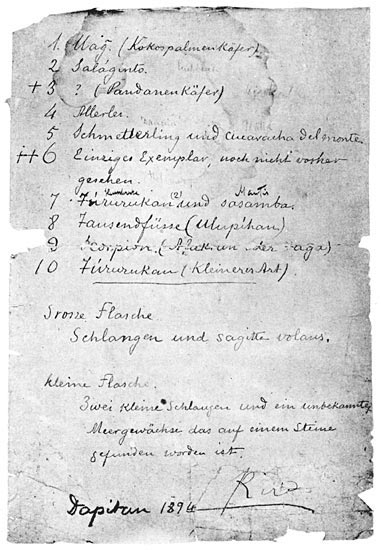
One of the lists of ethnographical material collected at Dapitan by Rizal for the Dresden Museum.
Page 211The Church benefited by the presence of the exile, for he drew the design for an elaborate curtain to adorn the sanctuary at Easter time, and an artist Sister of Charity of the school there did the oil painting under his direction. In this line he must have been proficient, for once in Spain, where he traveled out of his way to Saragossa to visit one of his former teachers of the Ateneo, who he had heard was there, Rizal offered his assistance in making some altar paintings, and the Jesuit says that his skill and taste were much appreciated.
|
The blind Mr. Taufer who had adopted Josefina Bracken. |
The home of the Sisters had a private chapel, for which the teachers were preparing an image of the Virgin. For the sake of economy the head only was procured from abroad, the vestments concealing all the rest of the figure except the feet, which rested upon a globe encircled by a snake in whose mouth is an apple. The beauty of the countenance, a real work of art, appealed to Rizal, and he modeled the more prominent right foot, the apple and the serpent’s head, while the artist Sister assisted by doing the minor work. Both curtain and image, twenty years after their making, are still in use.
On Sundays, Father Sanchez and Rizal conducted a school for the people after mass. As part of this education it was intended to make raised maps in the plaza of the chief city of the eight principal islands of the Philippines, but on account of Father Sanchez’s being called away, only one. Mindanao, was completed; it has been Page 212restored with a concrete sidewalk and balustrade about it, while the plaza is a national park.
Among Rizal’s patients was a blind American named Taufer, fairly well to do, who had been engineer of the pumping plant of the Hongkong Fire Department. He was a man of bravery, for he held a diploma for helping to rescue five Spaniards from a shipwreck in Hongkong harbor. And he was not less kind-hearted, for he and his wife, a Portuguese, had adopted and brought up as their own the infant daughter of a poor Irish woman who had died in Hongkong, leaving a considerable family to her husband, a corporal in the British Army on service there.
|
Rizal’s father-in-law. |
The little girl had been educated in the Italian convent after the first Mrs. Taufer died, and upon Mr. Taufer’s remarriage, to another Portuguese, the adopted daughter and Mr. Taufer’s own child were equally sharers of his home.
This girl had known Rizal, “the Spanish doctor,” as he was called there, in Hongkong, and persuaded her adopted father that possibly the Dapitan exile might restore his lost eyesight. So with the two girls and his wife, Mr. Taufer set out for Mindanao. At Manila his own daughter fell in love with a Filipino engineer, a Mr. Sunico, now owner of a foundry in Manila, and, marrying, remained there. But the party reached Dapitan with its original number, for they were joined by a good-looking mestiza from the South who was unofficially connected with one of the canons of the Manila cathedral.
Josefina Bracken, the Irish girl, was lively, capable and of congenial temperament, and as there no longer existed any reason against his marriage, for Rizal considered his Page 213political days over, they agreed to become husband and wife.
|
Carving of Josefina Bracken. |
The priest was asked to perform the ceremony, but said the Bishop of Cebu must give his consent, and offered to write him. Rizal at first feared that some political retraction would be asked, but when assured that only his religious beliefs would be investigated, promptly submitted a statement which Father Obach says covered about the same ground as the earliest published of the retractions said to have been made on the eve of Rizal’s death.
This document, inclosed with the priest’s letter, was ready for the mail when Rizal came hurrying in to reclaim it. The marriage was off, for Mr. Taufer had taken his family and gone to Manila.
The explanation of this sudden departure was that, after the blind man had been told of the impossibility of anything being done for his eyes, he was informed of the proposed marriage. The trip had already cost him one daughter, he had found that his blindness was incurable, and now his only remaining daughter, who had for seventeen years been like his own child, was planning to leave him. He would have to return to Hongkong hopeless Page 214and accompanied only by a wife he had never seen, one who really was merely a servant. In his despair he said he had nothing to live for, and, seizing his razor, would have ended his life had not Rizal seized him just in time and held him, with the firm grasp his athletic training had given him, till the commandant came and calmed the excited blind man.
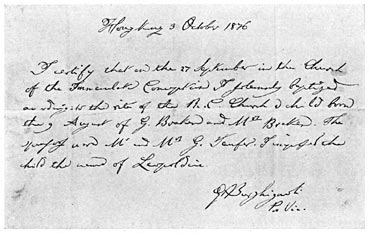
Josefina Bracken’s baptismal certificate proving her Irish parentage.
It resulted in Josefina returning to Manila with him, but after a while Mr Taufer listened to reason and she went back to Dapitan, after a short stay in Manila with Rizal’s family, to whom she had carried his letter of introduction, taking considerable housekeeping furniture with her.
Further consideration changed Rizal’s opinion as to marriage, possibly because the second time the priest may not have been so liberal in his requirements. The mother, too, seems to have suggested that as Spanish law had established civil marriage in the Philippines, and as the local government had not provided any way for people Page 215to avail themselves of the right, because the governor-general had pigeon-holed the royal decree, it would be less sinful for the two to consider themselves civilly married than for Rizal to do violence to his conscience by making any sort of political retraction. Any marriage so bought would be just as little a sacrament as an absolutely civil marriage, and the latter was free from hypocrisy.
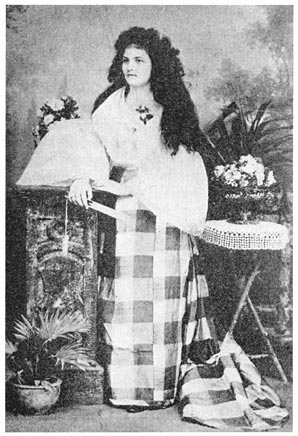
Josefina Bracken, afterwards Mrs. José Rizal—from a photograph.
So as man and wife Rizal and Josefina lived together Page 216in Talisay. Father Obach sought to prejudice public feeling in the town against the exile for the “scandal,” though other scandals happenings with less reason were going on unrebuked. The pages of “Dapitan”, which some have considered to be the first chapter of an unfinished novel, may reasonably be considered no more than Rizal’s rejoinder to Father Obach, written in sarcastic vein and primarily for Carnicero’s amusement, unless some date of writing earlier than this should hereafter be found for them.
Josefina was bright, vivacious, and a welcome addition to the little colony at Talisay, but at times Rizal had misgivings as to how it came that this foreigner should be permitted by a suspicious and absolute government to join him, when Filipinos, over whom the authorities could have exercised complete control, were kept away. Josefina’s frequent visits to the convento once brought this suspicion to an open declaration of his misgivings by Rizal, but two days of weeping upon her part caused him to avoid the subject thereafter. Could the exile have seen the confidential correspondence in the secret archives the plan would have been plain to him, for there it is suggested that his impressionable character could best be reached through the sufferings of his family, and that only his mother and sisters should be allowed to visit him. Steps in this plot were the gradual pardoning and returning of the members of his family to their homes.
Josefina must remain a mystery to us as she was to Rizal. While she was in a delicate condition Rizal played a prank on her, harmless in itself, which startled her so that she sprang forward and struck against an iron stand. Though it was pure accident and Rizal was scarcely at fault, he blamed himself for it, and his later devotion seems largely to have been trying to make amends.
Page 217The “burial of the son of Rizal,” sometimes referred to as occurring at Dapitan, has for its foundation the consequences of this accident. A sketch hastily penciled in one of his medical books depicts an unusual condition apparent in the infant which, had it regularly made its appearance in the world some months later, would have been cherished by both parents; this loss was a great and common grief which banished thereafter all distrust upon his part and all occasion for it upon hers.
Rizal’s mother and several of his sisters, the latter changing from time to time, had been present during this critical period. Another operation had been performed upon Mrs. Rizal’s eyes, but she was restive and disregarded the ordinary precautions, and the son was in despair. A letter to his brother-in-law, Manuel Hidalgo, who was inclined toward medical studies, says, “I now realize the reason why physicians are directed not to practice in their own families.”
A story of his mother and Rizal, necessary to understand his peculiar attitude toward her, may serve as the transition from the hero’s sad (later) married experience to the real romance of his life. Mrs. Rizal’s talents commanded her son’s admiration, as her care for him demanded his gratitude, but, despite the common opinion, he never had that sense of companionship with her that he enjoyed with his father. Mrs. Rizal was a strict disciplinarian and a woman of unexceptionable character, but she arrogated to herself an infallibility which at times was trying to those about her, and she foretold bitter fates for those who dared dispute her.
Just before José went abroad to study, while engaged to his cousin, Leonora Rivera, Mrs. Rivera and her daughter visited their relatives in Kalamba. Naturally the young man wished the guests to have the best of everything; one day when they visited a bathing place Page 218near by he used the family’s newest carriage. Though this had not been forbidden, his mother spoke rather sharply about it; José ventured to remind her that guests were present and that it would be better to discuss the matter in private. Angry because one of her children ventured to dispute her, she replied: “You are an undutiful son. You will never accomplish anything which you undertake. All your plans will result in failure.” These words could not be forgotten, as succeeding events seemed to make their prophecy come true, and there is pathos in one of Rizal’s letters in which he reminds his mother that she had foretold his fate.
|
Pencil sketch of Leonora by Rizal. |
His thoughts of an early marriage were overruled because his unmarried sisters did not desire to have a sister-in-law in their home who would add to the household cares but was not trained to bear her share of them, and even Paciano, who was in his favor, thought that his younger brother would mar his career by marrying early.
So, with fervent promises and high hopes, Rizal had sailed away to make the fortune which should allow him to marry his cousin Leonora. She was constantly in his thoughts and his long letters were mailed with regular frequency during all his first years in Europe; but only a few of the earliest ever reached her, and as few replies came into his hands, though she was equally faithful as a correspondent.
Leonora’s mother had been told that it was for the good of her daughter’s soul and in the interest of her Page 219happiness that she should not become the wife of a man like Rizal, who was obnoxious to the Church and in disfavor with the government. So, by advice, Mrs. Rivera gradually withheld more and more of the correspondence upon both sides, until finally it ceased. And she constantly suggested to the unhappy girl that her youthful lover had forgotten her amid the distractions and gayeties of Europe.
Then the same influence which had advised breaking off the correspondence found a person whom the mother and others joined in urging upon her as a husband, till at last, in the belief that she owed obedience to her mother, she reluctantly consented. Strangely like the proposed husband of the Maria Clara of “Noli Me Tangere,” in which book Rizal had prophetically pictured her, this husband was “one whose children should rule ”—an English engineer whose position had been found for him to make the match more desirable. Their marriage took place, and when Rizal returned to the Philippines she learned how she had been deceived. Then she asked for the letters that had been withheld, and when told that as a wife she might not keep love letters from any but her husband, she pleaded that they be burned and the ashes given her. This was done, and the silver box with the blackened bits of paper upon her dresser seemed to be a consolation during the few months of life which she knew would remain to her.
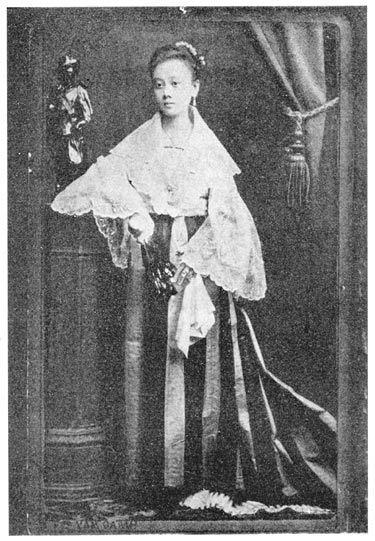
Leonora Rivera. Rizal’s cousin and fiancée at the age of 15.
Another great disappointment to Rizal was the action of Despujol when he first arrived in Dapitan, for he still believed in the Governor-General’s good faith and thought in that fertile but sparsely settled region he might plant his “New Kalamba” without the objection that had been urged against the British North Borneo project. All seemed to be going on favorably for the assembling of his relatives and neighbors in what then would be no Page 220Page 221longer exile, when most insultingly, the Governor-General refused the permission which Rizal had had reason to rely upon his granting. The exile was reminded of his deportation and taunted with trying to make himself a king. Though he did not know it, this was part of the plan which was to break his spirit, so that when he was touched with the sufferings of his family he would yield to the influences of his youth and make complete political retraction; thus would be removed the most reasonable, and therefore the most formidable, opponent of the unnatural conditions Philippines and of the selfish interests which were profiting by them. But the plotters failed in their plan; they had mistaken their man.
|
Letter to his nephew Mauricio Cruz written from Dapitan by Rizal. |
During all this time Rizal had repeated chances to escape, and persons high in authority seem to have urged flight upon him. Running away, however, seemed to him a confession of guilt; the opportunities of doing so always unsettled him, for each time the battle of self-sacrifice had to be fought over again; but he remained firm in his purpose. To meet death bravely is one thing; to seek it is another and harder thing; but to refuse life and choose death over and over again during many years is the rarest kind of heroism.
Rizal used to make long trips, sometimes cruising for a week in his explorations of the Mindanao coast, and some of his friends proposed to charter a steamer in Singapore and, passing near Dapitan, pick him up on one Page 222of these trips. Another Philippine steamer going to Borneo suggested taking him on board as a rescue at sea and then landing him at their destination, where he would be free from Spanish power. Either of these schemes would have been feasible, but he refused both.
Plans, which materialized, to benefit the fishing industry by improved nets imported from his Laguna home, and to find a market for the abaka of Dapitan, were joined with the introduction of American machinery, for which Rizal acted as agent, among planters of neighboring islands. It was a busy, useful life, and in the economic advancement of his country the exile believed he was as patriotic as when he was working politically.
Rizal personally had been fortunate, for in company with the commandant and a Spaniard, originally deported for political reasons from the Peninsula, he had gained one of the richer prizes in the government lottery. These funds came most opportunely, for the land troubles and succeeding litigation had almost stripped the family of all its possessions. The account of the first news in Dapitan of the good fortune of the three is interestingly told in an official report to the Governor-General from the commandant. The official saw the infrequent mail steamer arriving with flying bunting and at once imagined some high authority was aboard; he hastened to the beach with a band of music to assist in the welcome, but was agreeably disappointed with the news of the luck which had befallen his prisoner and himself.
Not all of Dapitan life was profitable and prosperous. Yet in spite of this Rizal stayed in the town. This was pure self-sacrifice, for he refused to make any effort for his own release by invoking influences which could have brought pressure to bear upon the Spanish home government. He feared to act lest obstacles might be put in the way of the reforms that were apparently making Page 223headway through Despujol’s initiative, and was content to wait rather than to jeopardize the prospects of others.
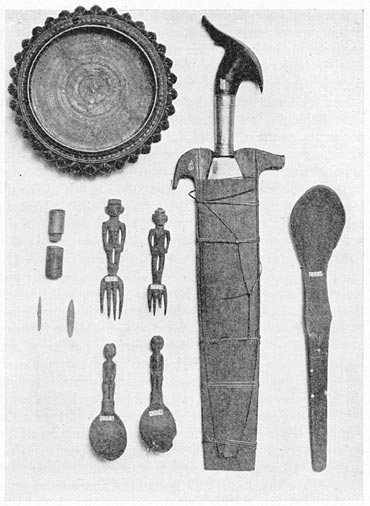
Ethnographical material collected by Rizal for the Royal Zoölogical Museum in Dresden, Saxony.
A plan for his transfer to the North, in the Ilokano country, had been deferred and had met with obstacles Page 224which Rizal believed were placed in its way through some of his own countrymen in the Peninsula who feared his influence upon the revenue with which politics was furnishing them.
Another proposal was to appoint Rizal district health officer for Dapitan, but this was merely a covert government bribe. While the exile expressed his willingness to accept the position, he did not make the “unequivocally Spanish” professions that were needed to secure this appointment.
Yet the government could have been satisfied of Rizal’s innocence of any treasonable designs against Spain’s sovereignty in the Islands had it known how the exile had declined an opportunity to head the movement which had been initiated on the eve of his deportation. His name had been used to gather the members together and his portrait hung in each Katipunan lodge hall, but all this was without Rizal’s consent or even his knowledge.
The members, who had been paying faithfully for four years, felt that it was time that something besides collecting money was done. Their restiveness and suspicions led Andrés Bonifacio, its head, to resort to Rizal, feeling that a word from the exile, who had religiously held aloof from all politics since his deportation, would give the Katipunan leaders more time to mature their plans. So he sent a messenger to Dapitan, Pio Valenzuela, a doctor, who to conceal his mission took with him a blind man. Thus the doctor and his patient appeared as on a professional visit to the exiled oculist. But though the interview was successfully secured in this way, its results were far from satisfactory.
Far from feeling grateful for the consideration for the possible consequences to him which Valenzuela pretended had prompted the visit, Rizal indignantly insisted that the country came first. He cited the Spanish Page 225republics of South America, with their alternating revolutions and despotisms, as a warning against embarking on a change of government for which the people were not prepared. Education, he declared, was first necessary, and in his opinion general enlightenment was the only road to progress. Valenzuela cut short his trip, glad to escape without anyone realizing that Rizal and he had quarreled.
Bonifacio called Rizal a coward when he heard his emissary’s report, and enjoined Valenzuela to say nothing of his trip. But the truth leaked out, and there was a falling away in Katipunan membership.
Doctor Rizal’s own statement respecting the rebellion and Valenzuela’s visit may fitly be quoted here:
“I had no notice at all of what was being planned until the first or second of July, in 1896, when Pio Valenzuela came to see me, saying that an uprising was being arranged. I told him that it was absurd, etc., etc., and he answered me that they could bear no more. I advised him that they should have patience, etc., etc. He added then that he had been sent because they had compassion on my life and that probably it would compromise me. I replied that they should have patience and that if anything happened to me I would then prove my innocence. ‘Besides,’ said I, ‘don’t consider me, but our country, which is the one that will suffer.’ I went on to show how absurd was the movement.—This, later, Pio Valenzuela testified.—He did not tell me that my name was being used, neither did he suggest that I was its chief, or anything of that sort.
“Those who testify that I am the chief (which I do not know, nor do I know of having ever treated with them), what proofs do they present of my having accepted this chiefship or that I was in relations with them or with their society? Either they have made use of my Page 226name for their own purposes or they have been deceived by others who have. Where is the chief who dictates no order and makes no arrangement, who is not consulted in anything about so important an enterprise until the last moment, and then when he decides against it is disobeyed? Since the seventh of July of 1892 I have entirely ceased political activity. It seems some have wished to avail themselves of my name for their own ends.”
This was Rizal’s second temptation to engage in politics, the first having been a trap laid by his enemies. A man had come to see Rizal in his earlier days in Dapitan, claiming to be a relative and seeking letters to prominent Filipinos. The deceit was too plain and Rizal denounced the envoy to the commandant, whose investigations speedily disclosed the source of the plot. Further prosecution, of course, ceased at once.
The visit of some image vendors from Laguna who never before had visited that region, and who seemed more intent on escaping notice than interested in business, appeared suspicious, but upon report of the Jesuits the matter was investigated and nothing really suspicious was found.
Rizal’s charm of manner and attraction for every one he met is best shown by his relations with the successive commandants at Dapitan, all of whom, except Carnicero, were naturally predisposed against him, but every one became his friend and champion. One even asked relief on the ground of this growing favorable impression upon his part toward his prisoner.
At times there were rumors of Rizal’s speedy pardon, and he would think of going regularly into scientific work, collecting for those European museums which had made him proposals that assured ample livelihood and congenial work.
Then Doctor Blumentritt wrote to him of the ravages Page 227of disease among the Spanish soldiers in Cuba and the scarcity of surgeons to attend them. Here was a labor “eminently humanitarian,” to quote Rizal’s words of his own profession, and it made so strong an appeal to him that, through the new governor-general, for Despujol had been replaced by Blanco, he volunteered his services. The minister of war of that time, General Azcarraga, was Philippine born. Blanco considered the time favorable for granting Rizal’s petition and thus lifting the decree of deportation without the embarrassment of having the popular prisoner remain in the Islands.
The thought of resuming his travels evidently inspired the following poem, which was written at about this time. The translation is by Arthur P. Ferguson:
The Song of the Traveler
Like to a leaf that is fallen and withered,
Tossed by the tempest from pole unto pole;
Thus roams the pilgrim abroad without purpose,
Roams without love, without country or soul.
Following anxiously treacherous fortune,
Fortune which e’en as he grasps at it flees;
Vain though the hopes that his yearning is seeking,
Yet does the pilgrim embark on the seas!
Ever impelled by invisible power,
Destined to roam from the East to the West;
Oft he remembers the faces of loved ones,
Dreams of the day when he, too, was at rest.
Chance may assign him a tomb on the desert,
Grant him a final asylum of peace;
Soon by the world and his country forgotten,
God rest his soul when his wanderings cease!
Often the sorrowful pilgrim is envied,
Circling the globe like a sea-gull above;
Little, ah, little they know what a void
Saddens his soul by the absence of love.
Home may the pilgrim return in the future,
Back to his loved ones his footsteps he bends;
Naught will he find but the snow and the ruins,
Ashes of love and the tomb of his friends.
Pilgrim, begone! Nor return more hereafter.
Stranger thou art in the land of thy birth;
Others may sing of their love while rejoicing,
Thou once again must roam o’er the earth.
Pilgrim, begone! Nor return more hereafter,
Dry are the tears that a while for thee ran;
Pilgrim, begone! And forget thy affliction,
Loud laughs the world at the sorrows of man.
Page 229
Chapter X
“Consummatum Est”
Notice of the granting of his request came to Rizal just when repeated disappointments had caused him to prepare for staying in Dapitan. Immediately he disposed of his salable possessions, including a Japanese tea set and large mirror now among the Rizal relics preserved by the government, and a piece of outlying land, the deed for which is also among the Rizalana in the Philippines library. Some half-finished busts were thrown into the pool behind the dam. Despite the short notice all was ready for the trip in time, and, attended by some of his schoolboys as well as by Josefina and Rizal’s niece, the daughter of his youngest sister, Soledad, whom Josefina wished to adopt, the party set out for Manila.
The journey was not an uneventful one; at Dumaguete Rizal was the guest of a Spanish judge at dinner; in Cebu he operated successfully upon the eyes of a foreign merchant; and in Iloilo the local newspaper made much of his presence.
The steamer from Dapitan reached Manila a little too late for the mail boat for Spain, and Rizal obtained permission to await the next sailing on board the cruiser Castilla, in the bay. Here he was treated like a guest and more than once the Spanish captain invited members of Rizal’s family to be his guests at dinner—Josefina with little Maria Luisa, the niece and the schoolboys, for whom positions had been obtained, in Manila.
The alleged uprising of the Katipunan occurred during this time. A Tondo curate, with an eye to promotion, professed to have discovered a gigantic conspiracy. Incited by him, the lower class of Spaniards in Manila made demonstrations against Blanco and tried to force that Page 230ordinarily sensible and humane executive into bloodthirsty measures, which should terrorize the Filipinos. Blanco had known of the Katipunan but realized that so long as interested parties were using it as a source of revenue, its activities would not go much beyond speechmaking. The rabble was not so far-seeing, and from high authorities came advice that the country was in a fever and could only be saved by blood-letting.
Wholesale arrests filled every possible place for prisoners in Manila. The guilt of one suspect consisted in having visited the American consul to secure the address of a New York medical journal, and other charges were just as frivolous. There was a reign of terror in Luzon and, to save themselves, members of the Katipunan resorted to that open warfare which, had Blanco’s prudent counsels been regarded, would probably have been avoided.
While the excitement was at its height, with a number of executions failing to satisfy the blood-hunger, Rizal sailed for Spain, bearing letters of recommendation from Blanco. These vouched for his exemplary conduct during his exile and stated that he had in no way been implicated in the conspiracies then disturbing the Islands.
The Spanish mail boat upon which Rizal finally sailed had among its passengers a sick Jesuit, to whose care Rizal devoted himself, and though most of the passengers were openly hostile to one whom they supposed responsible for the existing outbreak, his professional skill led several to avail themselves of his services. These were given with a deference to the ship’s doctor which made that official an admirer and champion of his colleague.
Three only of the passengers, however, were really friendly—one Juan Utor y Fernandez, a prominent Mason and republican, another ex-official in the Philippines Page 231who shared Utor’s liberal views, and a young man whose father was republican.
But if Rizal’s chief adversaries were content that he should go where he would not molest them or longer jeopardize their interests, the rabble that had been excited by the hired newspaper advocates was not so easily calmed. Every one who felt that his picture had been painted among the lower Spanish types portrayed in “Noli Me Tangere” was loud for revenge. The clamor grew so great that it seemed possible to take advantage of it to displace General Blanco, who was not a convenient tool for the interests.
So his promotion was bought, it is said, to get one Polavieja, a willing tool, in his place. As soon as this scheme was arranged, a cablegram ordering Rizal’s arrest was sent; it overtook the steamer at Suez. Thus as a prisoner he completed his journey.
But this had not been entirely unforeseen, for when the steamer reached Singapore, Rizal’s companion on board, the Filipino millionaire Pedro P. Roxas, had deserted the ship, urging the ex-exile to follow his example. Rizal demurred, and said such flight would be considered confession of guilt, but he was not fully satisfied in his mind that he was safe. At each port of call his uncertainty as to what course to pursue manifested itself, for though he considered his duty to his country already done, and his life now his own, he would do nothing that suggested an uneasy conscience despite his lack of confidence in Spanish justice.
At first, not knowing the course of events in Manila, he very naturally blamed Governor-General Blanco for bad faith, and spoke rather harshly of him in a letter to Doctor Blumentritt, an opinion which he changed later when the truth was revealed to him in Manila.
Upon the arrival of the steamer in Barcelona the prisoner Page 232was transferred to Montjuich Castle, a political prison associated with many cruelties, there to await the sailing that very day of the Philippine mail boat. The Captain-General was the same Despujol who had decoyed Rizal into the power of the Spaniards four years before. An interesting interview of some hours’ duration took place between the governor and the prisoner, in which the clear conscience of the latter seems to have stirred some sense of shame in the man who had so dishonorably deceived him.
He never heard of the effort of London friends to deliver him at Singapore by means of habeas-corpus proceedings. Mr. Regidor furnished the legal inspiration and Mr. Baustead the funds for getting an opinion as to Rizal’s status as a prisoner when in British waters, from Sir Edward Clarke, ex-solicitor-general of Great Britain. Captain Camus, a Filipino living in Singapore, was cabled to, money was made available in the Chartered Bank of Singapore, as Mr. Baustead’s father’s firm was in business in that city, and a lawyer, now Sir Hugh Fort, K.C., of London, was retained. Secretly, in order that the attempt, if unsuccessful, might not jeopardize the prisoner, a petition was presented to the Supreme Court of the Straits Settlements reciting the facts that Doctor José Rizal, according to the Philippine practice of punishing Freemasons without trial, was being deprived of his liberty without warrant of law upon a ship then within the jurisdiction of the court.
According to Spanish law Rizal was being illegally held on the Spanish mail steamer Colon, for the Constitution of Spain forbade detention except on a judge’s order, but like most Spanish laws the Constitution was not much respected by Spanish officials. Rizal had never had a hearing before any judge, nor had any charge yet been placed against him. The writ of habeas corpus was justified, Page 233provided the Colon were a merchant ship that would be subject to British law when in British port, but the mail steamer that carried Rizal also had on board Spanish soldiers and flew the royal flag as if it were a national transport. No one was willing to deny that this condition made the ship floating Spanish territory, and the judge declined to issue the writ.
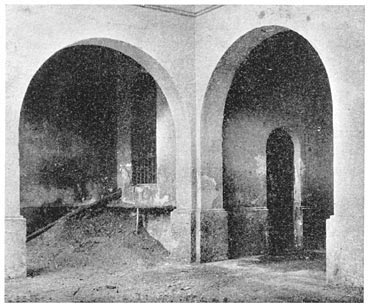
Cell in which Rizal was imprisoned, and dungeon where he was incomunicado, Fort Santiago.
Rizal reached Manila on November 3 and was at once transferred to Fort Santiago, at first being held in a dungeon “incomunicado” and later occupying a small cell on the ground floor. Its furnishings had to be supplied by himself and they consisted of a small rattan table, a high-backed chair, a steamer chair of the same material, and a cot of the kind used by Spanish officers—Page 234canvas top and collapsible frame which closed up lengthwise. His meals were sent in by his family, being carried by one of his former pupils at Dapitan, and such cooking or heating as was necessary was done on an alcohol lamp which had been presented to him in Paris by Mrs. Tavera.
An unsuccessful effort had been made earlier to get evidence against Rizal by torturing his brother Paciano. For hours the elder brother had been seated at a table in the headquarters of the political police, a thumbscrew on one hand and pen in the other, while before him was a confession which would implicate José Rizal in the Katipunan uprising. The paper remained unsigned, though Paciano was hung up by the elbows till he was insensible, and then cut down that the fall might revive him. Three days of this maltreatment made him so ill that there was no possibility of his signing anything, and he was carted home.
It would not be strictly accurate to say that at the close of the nineteenth century the Spaniards of Manila were using the same tortures that had made their name abhorrent in Europe three centuries earlier, for there was some progress; electricity was employed at times as an improved method of causing anguish, and the thumbscrews were much more neatly finished than those used by the Dons of the Dark Ages.
Rizal did not approve of the rebellion and desired to issue a manifesto to those of his countrymen who had been deceived into believing that he was their leader. But the proclamation was not politic, for it contained none of those fulsomely flattering phrases which passed for patriotism in the feverish days of 1896. The address was not allowed to be made public but it was passed on to the prosecutor to form another count in the indictment of José Rizal for not esteeming Spanish civilization.
Page 235The following address to some Filipinos shows more clearly and unmistakably than any words of mine exactly what was the state of Rizal’s mind in this matter.
Countrymen:
On my return from Spain I learned that my name had been in use, among some who were in arms, as a war-cry. The news came as a painful surprise, but, believing it already closed, I kept silent over an incident which I considered irremediable. Now I notice indications of the disturbances continuing and if any still, in good or bad faith, are availing themselves of my name, to stop this abuse and undeceive the unwary I hasten to address you these lines that the truth may be known.
From the very beginning, when I first had notice of what was being planned, I opposed it, fought it, and demonstrated its absolute impossibility. This is the fact, and witnesses to my words are now living. I was convinced that the scheme was utterly absurd, and, what was worse, would bring great suffering.
I did even more. When later, against my advice, the movement materialized, of my own accord I offered not alone my good offices, but my very life, and even my name, to be used in whatever way might seem best, toward stifling the rebellion; for, convinced of the ills which it would bring, I considered myself fortunate if, at any sacrifice, I could prevent such useless misfortunes. This equally is of record. My countrymen, I have given proofs that I am one most anxious for liberties for our country, and I am still desirous of them. But I place as a prior condition the education of the people, that by means of instruction and industry our country may have an individuality of its own and make itself worthy of these liberties. I have recommended in my writings the study of the civic virtues, without which there is no redemption. Page 236I have written likewise (and I repeat my words) that reforms, to be beneficial, must come from above, that those which come from below are irregularly gained and uncertain.
Holding these ideas, I cannot do less than condemn, and I do condemn this uprising—as absurd, savage, and plotted behind my back—which dishonors us Filipinos and discredits those who could plead our cause. I abhor its criminal methods and disclaim all part in it, pitying from the bottom of my heart the unwary who have been deceived.
Return, then, to your homes, and may God pardon those who have worked in bad faith!
José Rizal.
Fort Santiago, December 15, 1896.
